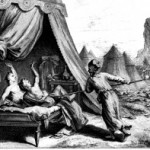Hard to live with – Pinchas
 Zealots are not easy company. They are too serious, too intense, too single-minded.
Zealots are not easy company. They are too serious, too intense, too single-minded.
You feel they have lost all sense of humour, all capacity for self-deprecation. They are so sure they are right and everyone else is wrong. Whatever the cause they believe in so firmly, you think they might serve it better by being a bit more laid-back.
The first of the Biblical zealots was Pinchas. When he saw something intolerable, he couldn’t stand it. He had to stand up and speak up. He even took the law into his own hands and killed the people responsible for the hateful deed. Whether he became hard to live with as a result of his fanaticism, we cannot be certain.
But one thing we know. God could have rebuked him and removed his priestly status, but He recognised why Pinchas had acted as he did.
Said God, “Pinchas the son of Elazar the son of Aaron the priest has turned My anger away from the children of Israel, in that he was very zealous for My sake” (Num. 25:10-11). Pinchas the priest did not forfeit his priesthood. God understood and forgave him.
What marked Pinchas is what Ignaz Maybaum calls his “messianic impatience”. Maybaum explains, “That is the messianic impatience which is a feature of the Jewish character. The Kingdom of God may come at any moment, and those who appear to be zealots may, if God wills it, become justified as true prophets”.
To be messianically impatient does not necessarily mean storming the heavens and forcing God to send the Mashiach before He is ready. It does mean being the champion of truth, justice, peace and morality and making the world ready for the Messiah.
That was Pinchas: he saw gross immorality in the camp and knew that it would hold back the moment when Israel would become “a kingdom of priests and a holy nation”.
It would help our age to have a Pinchas or two, not that they should go as far as Pinchas and carry out an act of physical violence, but insisting that there is such a thing as right and wrong and not remaining silent when “each person does that which is right in their own eyes”.



